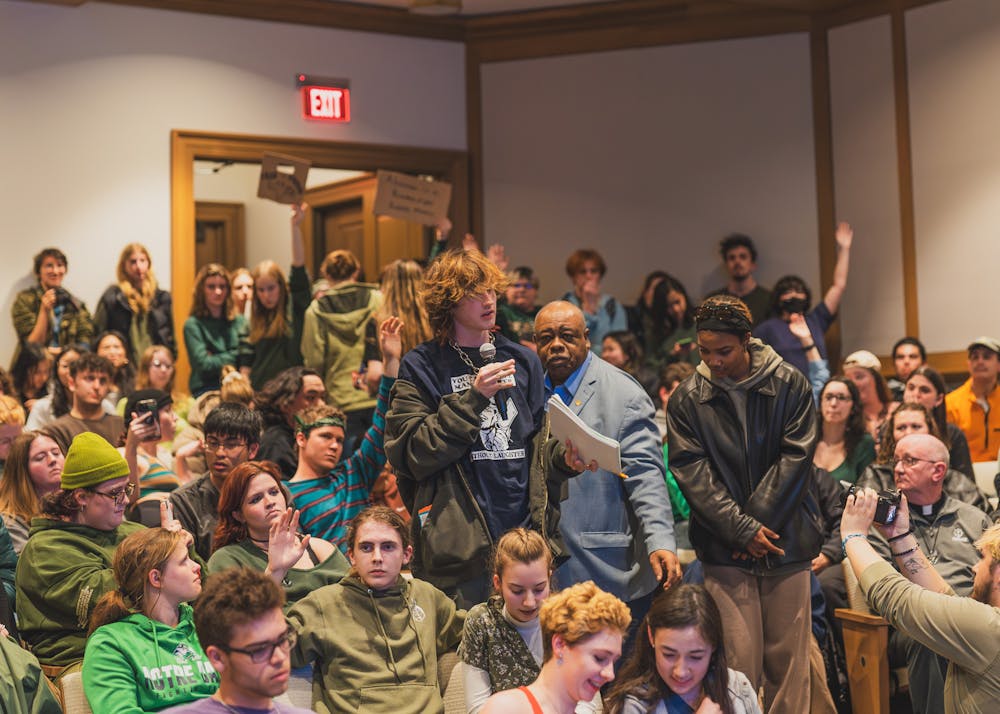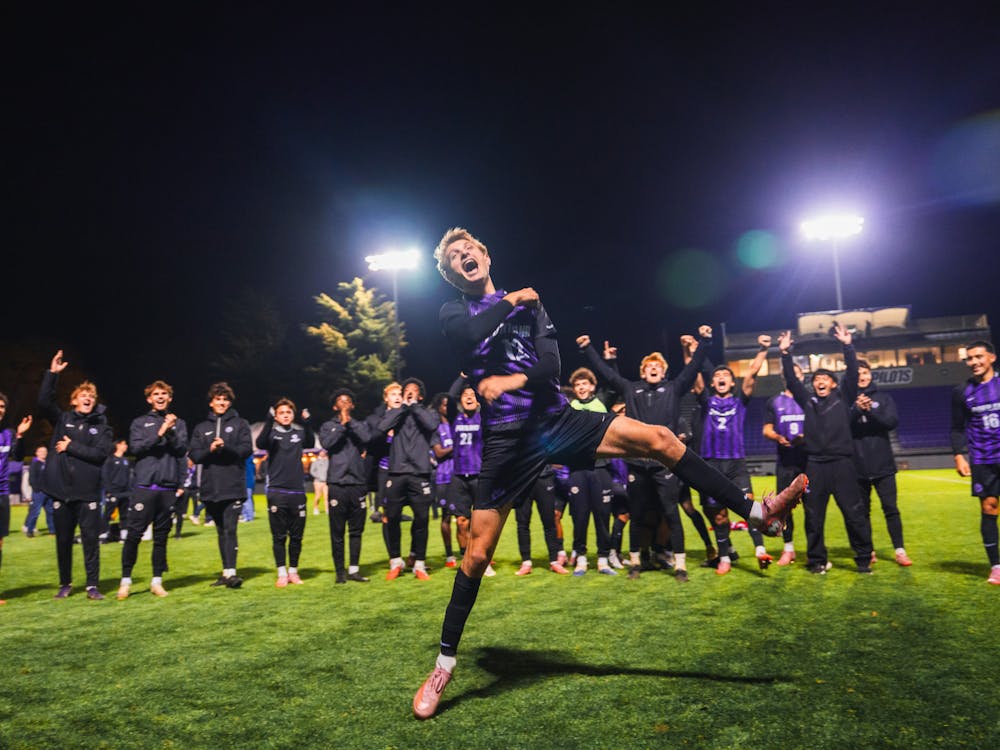UP joins dozens of colleges and universities across the country in refining and tightening their protest policies after a turbulent semester of pro-Palestinian demonstrations, which led to more than 3,100 arrests and violent confrontations between police and protestors.
The University's revised policy in the 2024-25 Life in the Bluff student handbook aims to clarify how students can engage in nonviolent demonstrations, marches, rallies or protests referred to collectively as “demonstrations.”
Compared to the previous policy's three rules — demonstrations must be peaceful, organized by UP community members and not to disrupt university operations — the new policy introduces nine specific rules.
It requires students to notify the Director of Campus Safety and Emergency Management and the Dean of Students two business days before a planned demonstration. It also prohibits the use of tents or barriers and gives clearer guidelines for counterprotests.
Drafting the new policy began in the summer, spearheaded by Vice President of Student Affairs Fr. John Donato and Residence Life Assistant Director for Student Conduct and Community Standards Joshua Bode. According to Fr. Donato and Bode, the new policy was primarily developed as part of UP’s annual evaluation of its policies.
“It's one of those things that we've just never updated,” said Donato.
Fr. Donato and Bode say that the new policy, in essence, formalizes the existing approval process, which had not been fully documented in previous years.
Previously, students planning a demonstration would meet with the Dean of Students, the Director of Campus Safety, and sometimes the Director of Student Activities, even though the Life on The Bluff handbook only required written notice to the Dean of Students.
“We decided to put it down in writing basically what we've been doing,” Donato said. “We saw that other universities do the same thing. So that's kind of the impetus…How can I put in writing not the overly legalistic things I saw online, looking at other universities, but encapsulate what our best practice has been here and keep our Catholic character.”
Fr. Donato acknowledges nearby pro-Palestinian protests, such as the Portland State Miller Library occupation, were another factor that influenced the policy change.
While UP has not experienced a demonstration to this extent, Franz Hall and Mago Hunt were vandalized with the words “Palestine” and “Free Palestine” near the end of the academic year. According to Director of Campus Safety and Emergency Management Michael McNerney, those responsible for the act were not affiliated with UP.

However, Donato believes the new policy is a proactive step to prevent large-scale protests at UP.
“Do we wait until something happens and then respond, rather than make ourselves clear now about what we believe our values are in this community, how we want to keep this going well?” Donato said. “It seems to me [that] I'd rather be on the side of proactively communicating with our students that these are the expectations because they're built on our values and our history.”
According to Bode, revising the University's demonstration policy was collaborative, including student feedback from Associated Students of the University of Portland (ASUP) President Aidan Sanchez and assistance from former Associate Vice President for Student Development and Dean of Students Tamara Herdener.
Bode expressed that the collaboration resulted in a policy that creates a “more supportive structure” for students who wish to demonstrate.
“It was so collaborative, and we collaborated with other institutions on what their policy drafts looked like, and kind of what people were seeing either worked or where they needed to have more information,” Bode said. “I don't think at any point there was ever a draft that anyone looked at and thought, ‘Oh no, that’s not going to do.’ I think it was very intentional and that we wanted to add things. We wanted to clarify things.”
In addition to Herdener and Sanchez, President Robert D. Kelly played a role in shaping the policy's direction, emphasizing the importance of balancing student expression with the University's operational needs.
“I think it is about building trust, but it's more about being in conversation because there might be a situation [where] we kind of go, ‘I fundamentally disagree,’ but yet, we have to be in communication with one another,” Kelly said. “It doesn't mean we're always going to agree with the outcome, but it does mean that we have to be in communication with one another, that the interests, the larger interest, is really important…”
Kelly’s emphasis on dialogue and mutual understanding is reflected in the amended policy, as students planning demonstrations on campus are now required to notify and schedule a meeting with the Director of Campus Safety and Emergency Management and the Dean of Students to receive guidance on how to conduct activities safely and responsibly.
However, Doanto also suggests that this meeting serves as a time for the administration to understand students’ demonstration goals.
“I think the importance of it [conversations] is to actually make sure we understand the students' goals because there's a difference between I want to say something, I want to demonstrate something, and I want to interrupt something, or I want to stop something that can be a little more of a situation where the university's business can't happen,” Donato said.
According to Political Science Professor William Curtis, who received his Doctor of Jurisprudence from the University of California San Francisco, this requirement reflects a common legal restriction of expressive activity known as “time, place and manner.”
Curtis also affirms the revised policy aligns with typical free speech and expression policies at private institutions because, unlike public institutions, UP is not required to follow the First Amendment.
“A private university, because it's a private entity, can have its own rules,” Curtis said. “...Now in America, most institutions, most colleges and universities that want to be taken seriously as places of learning and research and so forth, they have what we [UP] have. They have a statement saying we are committed to free speech with language about how we're sensitive to speech that demeans the dignity of the human person.”
However, several gray areas remain within the updated policy.
Curtis points out that although the policy states the University has the authority to approve a demonstration, it remains unclear whether they also have the authority to disapprove a demonstration based on its content — and, if so, according to what standards.
For example, rule nine, which prohibits expression that is indecent, grossly obscene or grossly offensive, is inherently vague, as the nature of protest often involves expressing views that may be offensive to some, according to Curtis.
“Right now, this [the policy] is indicating that they're not going to do that [disapprove a demonstration],” Curtis said. “But on the other hand, it's also clear that they seem to have the power to do that… [and] it doesn't say exactly who makes that determination if something's grossly offensive…I would like ‘grossly offensive’ a little bit better defined and who makes that judgment.”
In a follow-up email sent to Fr. Donato to clarify how the University defines grossly obscene or offensive in the context of this policy, he stated he had already answered the question in a previous interview.
“We [previously] talked about how demonstrations aren’t approved or disapproved as much as a collaboration with students so they can give voice to their views in a thoughtful manner and in a way consistent with the values of our UP community,” Donato said in an email to The Beacon. “The other main goal of the policy, of course, is to allow UP to keep our teaching and learning and other processes going safely.”
While the new policy may seem like an abrupt change for students, the new guidelines are also a protective measure to deter outside groups from coming onto campus.
During the activities fair this fall, Turning Point USA, a controversial extremist organization, solicited students while passing out materials. According to Director of Student Activities Jeormy Koffler, the group did not receive permission to table at the event.
“The representative from Turning Point eventually admitted they didn’t follow through and ask [for permission],” Koffler said in an email to The Beacon. “In reality, they had no interest in gaining permission as they just wanted to know who was responsible for the fair so if they were confronted, they could respond with the correct department. To their surprise, I was the person who confronted them, and when their lie was exposed, they initially refused to leave, attempting to ignore my requests to do so.
“After several attempts to reason with the person, I was forced to call Campus Safety, who assisted me in escorting them off campus.”
Kelly acknowledges that situations like this make it challenging for the University to balance student expression, safety and institutional responsibilities. However, he hopes the new policy will help guide these decisions and says he trusts students to do the right thing.
“I trust students implicitly and completely,” Kelly said. “...I think sometimes outside forces can come into play and students can be swept in just as they can with any population or any group of people. Outside forces can be swept in, and what we're most concerned about is our students, their learning, their ability to get everything they can out of the university experience.”
Editors Note: A previous version of this article incorrectly spelled the word Palestinian.
Julianna Pedone is the News and Managing Editor for The Beacon. She can be reached at pedone25@up.edu.
Kimberly Cortez is the Editor-in-Chief of The Beacon. They can be reached at cortez25@up.edu.








